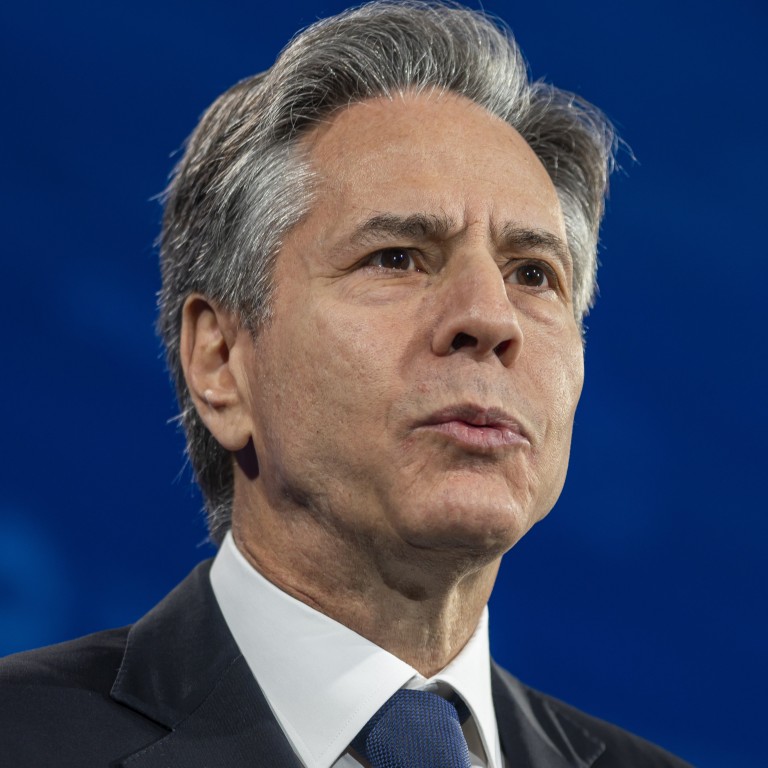
Blinken will visit China in February to discuss ‘broad array of issues’, State Department says
- Few details revealed for top American diplomat’s trip viewed as potentially paving way for Xi Jinping to attend Apec in San Francisco in November
- Biden administration’s continued urging of Beijing to be ‘fully transparent’ in Covid handling will not affect trip, spokesman adds
US Secretary of State Antony Blinken will travel to China next month, the State Department said on Wednesday, offering no specific dates and few details other than that America’s top diplomat hopes to meet with a variety of officials in Beijing.
“Now that we are in early 2023, I would expect that the secretary will have an opportunity to travel to Beijing next month,” said US State Department spokesman Ned Price.
The administration hoped Blinken would “have an opportunity to meet with several interlocutors to discuss the broad array of issues that form the basis of what is arguably the most consequential bilateral relationship in the world”, Price added.
But many doubt this is a fundamental rapprochement but rather a tactical easing given the many economic, military and social challenges facing China’s leadership.
Xi Jinping expresses concern about Covid’s spread into China’s countryside
The travel requirement put in place in late December stipulating that travellers from China obtain Covid tests before entering the US reflected these concerns, Price noted.
“Those measures are based on both the prevalence of Covid in the PRC, but also what we were seeing at the time, or namely what we were not seeing at the time, the lack of transparent data distribution from the PRC, principally to the WHO, including the genomic sequencing,” he said, using the initials for China’s official name.
In the month leading up to January 8, China reported just 37 deaths from local cases, according to figures released on the Chinese Centre for Disease Control and Prevention website. Yet earlier this week, it revised its figures and said it recorded 59,938 deaths between December 8 and January 12.
They have argued that Beijing’s policy turnaround was neither sudden nor unplanned, that China was not opposed to importing foreign drugs, and that the US had not been transparent about the risk of exporting its own variants.
Price on Wednesday said the issue of Covid transparency had not coloured any plans for Blinken’s trip.
“Secretary Blinken fully expects to travel to Beijing next month. That is something that we are still planning for on a daily basis,” he said. “We’re working closely with our counterparts in the PRC to see to it that this trip is constructive.”
“Though its past action has helped to counter illicit synthetic drugs, we continue to urge the PRC to take additional meaningful concrete action to curb the diversion of precursor chemicals and equipment used by criminals to manufacture fentanyl and other synthetic drugs,” Price said.
Washington is committed to working with China in areas where the two economic giants could do so together constructively, he added. “This is very much one of those areas,” Price said.
Blinken discusses US-China ties with incoming Chinese FM Qin Gang
Separately, when asked if the Biden administration was going to tone down its rhetoric toward China now that relations seemed more stable, White House Press Secretary Karine Jean-Pierre said she did not expect such an adjustment.
“We’re very clear on our approach with China. That hasn’t changed,” she said. “We’re looking for a competition, right? That’s how we see our relationship with China. And, you know, that hasn’t changed. It’s not going to change.”
“We of course monitor all global developments and continue to stay in touch with our partners, allies and key market sectors, including China,” she said, adding mistakenly that Yellen was now in China.
“Have you have seen Secretary Yellen is in China and she’s going to be meeting with China’s vice-president on Wednesday, which is today? And so again, she’s there currently right now in China.”

